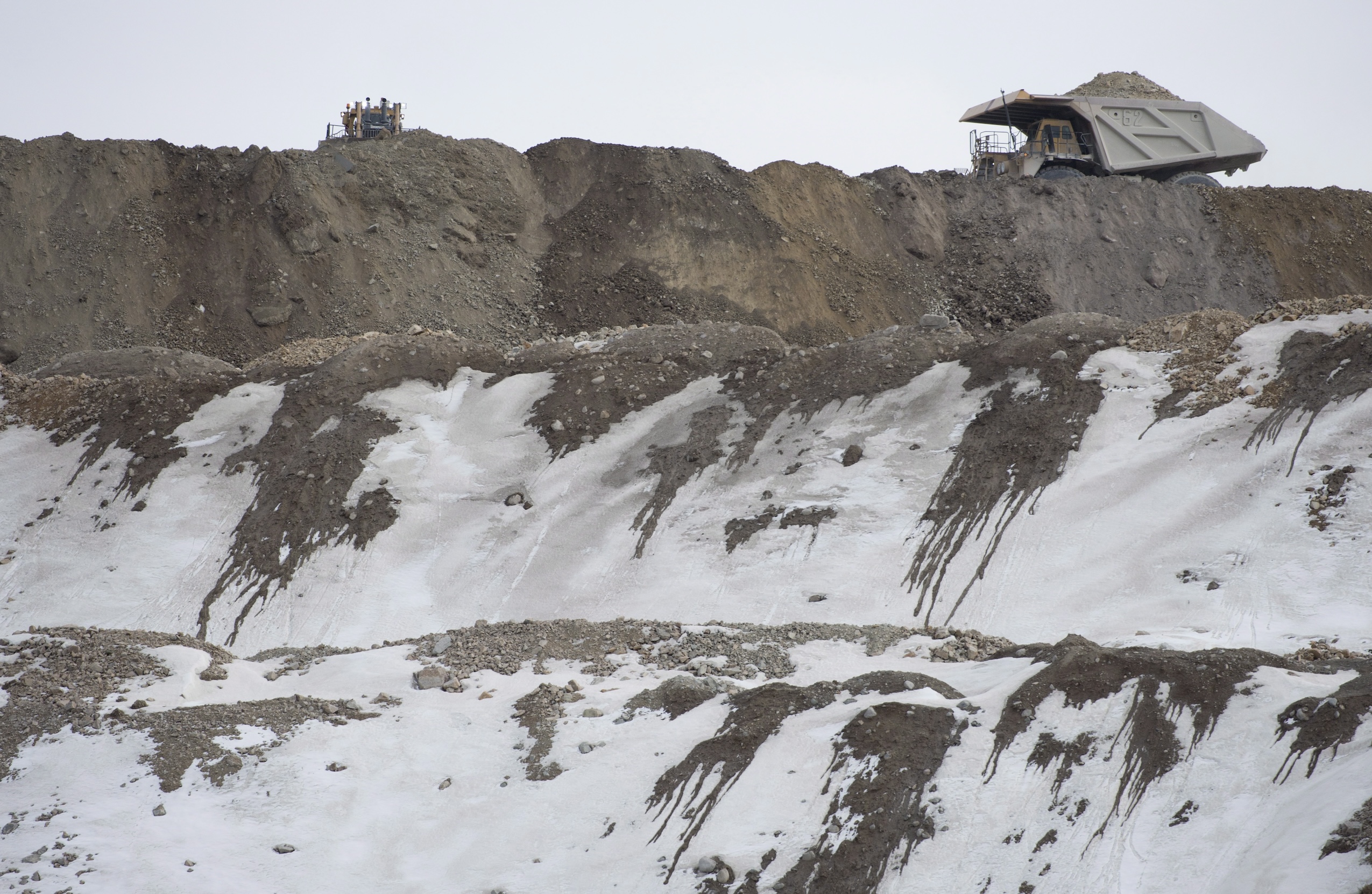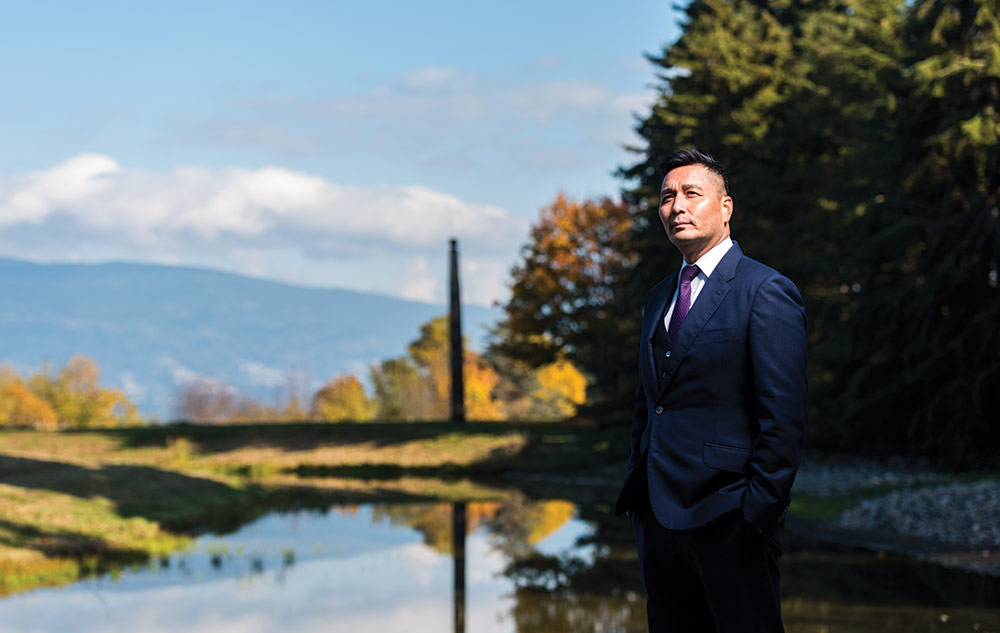
The site of an infamous B.C. mining disaster could get even bigger. This First Nation is going to court — and ‘won’t back down’
Xatśūll First Nation is challenging B.C.’s approval of Mount Polley mine’s tailings dam raising. Indigenous...
Get the inside scoop on The Narwhal’s environment and climate reporting by signing up for our free newsletter.
Nothing unifies Canadians like disdain for the United States. Many have argued this negative quality — “not American” — is our defining characteristic. Over the past few weeks, political leaders across Canada have attempted to shrug off that uninspiring reputation and envision a future less tethered to our neighbours, rallying around a vision of a robust Canadian economy that does not live and die by the American-bound goods that make up more than three quarters of our exports.
Hastening resource extraction — which makes up roughly 12 per cent of B.C.’s gross domestic product — is core to this political vision and, to that end, B.C. Premier David Eby recently announced 18 mining and energy projects his government intends to “fast-track.”
Many British Columbians have cheered on this initiative — everyone can get behind the dream of an efficient government process, if such a thing exists. But in his comments, Eby suggested Indigenous communities have long slowed down project approvals, saying at a mineral exploration conference in January that his government’s “hyper-focusing on things like Indigenous reconciliation” had pulled attention from economic growth.

But economic growth in the form of resource extraction can’t happen without Indigenous consultation — and it’s unclear how the provincial government hopes to fast-track that part of the process. Among the 18 projects the province intends to expedite are several opposed by Indigenous nations, including the Highland Valley copper mine extension in the Interior, which is opposed by the Stk’emlupsemc te Secwepemc Nation. Last November, the First Nation issued a statement regarding its assessment of the extension, saying the impacts were “neither reasonable nor sustainable,” and would exacerbate the damage already done by the mine to its territory.
And on Feb. 7, the Tahltan Nation released a statement saying it was “frustrated” and “surprised” by the province’s announcement of projects to be fast-tracked, two of them in Tahltan territory. Notably, both projects — the Eskay Creek mine “revitalization” project and Red Chris mine expansion — are subject to first-of-their-kind agreements between the province and a First Nations government under Section 7 of B.C.’s Declaration on the Rights of Indigenous Peoples Act, known as DRIPA, which recognizes First Nations jurisdiction. “This decision was made without engaging the Tahltan Nation, even though there are formal joint decision-making agreements in place between B.C. and the Tahltan Central Government about how decisions will occur regarding these mines,” the statement says.
Eby, like other premiers, is hoping his constituents believe acceleration is the same thing as progress. But putting his foot on the gas will drive the province straight into a brick wall — one that’s easy to see coming. Merle Alexander, a principal with Miller Titerle + Company who helped develop DRIPA and has worked with the provincial government to implement it, says the province has not shown it’s capable of moving faster on resource projects.
For one thing, Alexander points out, not all First Nations are the same — either in their economic interests or in their experience with industry. There are well-resourced First Nations with robust assessment processes that are capable of scrutinizing proposed projects and understanding how they would impact the nation: Tahltan Nation is well versed in the mining industry, while Haisla and Tsleil-Waututh both have significant experience in the liquefied natural gas (LNG) sector. That experience may or may not lead to industry partnerships — Haisla and Tsleil-Waututh have taken very different positions on LNG, to put it mildly — but the nations are resourced to make those decisions. “On the other end of the spectrum, there are small communities where the same individual is on council, has four or five portfolios to manage and has a stack of consultation referrals a metre deep,” Alexander says. Not all the 203 First Nations in B.C. have the tools to make informed decisions as quickly as industry or the province would like to see.

But they’re not the only hold-up. “The B.C. government has an inflated sense of what it’s done for reconciliation,” Alexander says, pointing to the Tahltan agreements. “The agreements speak for themselves: they have only achieved two consent-based agreements in six years,” he says, referring to 2019, when DRIPA came into effect. If they had been achieving reconciliation at a faster pace, Alexander adds, you’d expect to see similar agreements with other First Nations throughout the province.
Last June, former minister of water, land and resource stewardship Nathan Cullen told Gitanyow Hereditary Chiefs the province was putting some reconciliation and conservation initiatives on the backburner until after the provincial election, which took place in October. Among the government’s paused initiatives was its planned announcement with Gitanyow, a Gitxsan community in northwest B.C., to declare a pause on new mineral claims in the Meziadin region of their territory. “They hit the brakes on a lot of negotiations,” Alexander says. “I think they’d struggle to see how they’ve achieved progressive agreements that would allow us to put a big checkmark beside ‘reconciliation.’” In other words, the province needs to build capacity before it can move faster, too.
Many Indigenous nations are understandably concerned about resource projects in their territories, so making informed decisions about how and if to participate is crucial. A First Nation may receive a portion of the economic benefits, but it tends to bear a far greater share of the costs: irrevocable changes to the landscape, degradation of traditional foods and medicines and contamination from tailings ponds and other industrial waste. In northeast B.C., Indigenous communities bear the brunt of fracking-related health impacts, such as higher rates of childhood leukemia and birth defects.
In a statement following Eby’s announcement, the Canadian Association of Physicians for the Environment said it is concerned Eby’s fast-tracking plan is “laying the groundwork to expand LNG, an industry responsible for worsening health and air and water quality, increasing healthcare system costs, insurance rates and the cost of living, and [which] is making the impacts of climate change even more dramatic for people across B.C.”
While some no doubt embrace the idea of industrial progress unimpeded by pesky First Nations, the fact remains that Indigenous consultation is not a matter of etiquette nor a woke gesture adopted by the diversity, equity and inclusion (DEI)-minded. It is a legal requirement — and one that is also necessary for efficiency. Moving fast without due care, Alexander says, will lead to “more judicial reviews of permits, and if those show they failed in their duty to consult, that will lead to injunctions, which will lead the projects to stop advancing.” Trying to fast-track consent only makes a project slower and more expensive in the long run. The Trans Mountain pipeline expansion is a textbook example: a project that “effectively died in the courts” due to First Nations’ opposition — before Ottawa swooped in to save it (at a mounting cost to taxpayers of $18.8 billion so far).
“If they want to advance at a faster pace, in specific areas, then they should be implementing better decision-making mechanisms with those nations,” Alexander says. “It’s not benefitting anybody [to act] without mindfully thinking through, ‘What does accelerating this project mean?’ And I don’t get the sense that the B.C. government is really coming to those nations with solutions yet.”
Canadian leaders want to come out strongly against American threats to the national economy and security — but making commitments they’re not prepared to keep will only undermine their patriotic intentions in the end, as well undermining the trust they’ve worked hard to build with First Nations partners. If there’s one lesson to take from America’s current plight, it’s that hasty leadership wreaks havoc, along with chaos and confusion. We have enough problems of our own in Canada — we don’t need to import more. Tariffs aside, the costs are already too high.
Get the inside scoop on The Narwhal’s environment and climate reporting by signing up for our free newsletter. When I visited my reserve, Moose Factory,...
Continue reading
Xatśūll First Nation is challenging B.C.’s approval of Mount Polley mine’s tailings dam raising. Indigenous...

As the top candidates for Canada’s next prime minister promise swift, major expansions of mining...

Financial regulators hit pause this week on a years-long effort to force corporations to be...

